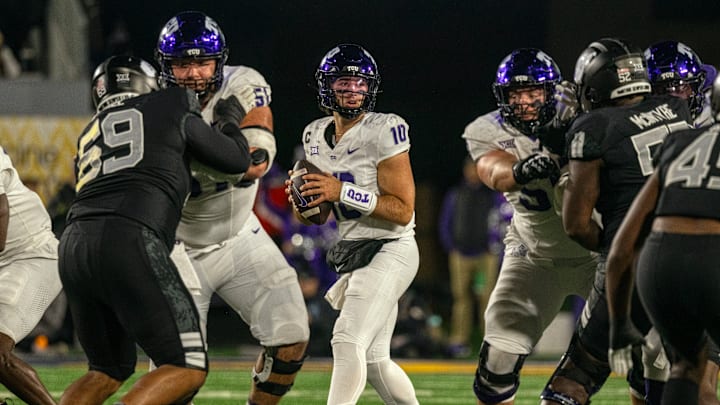Homecoming weekend and the West Virginia Mountaineers’ Coal Rush game brought plenty of excitement for a program that entered the matchup against TCU with a 2-5 record. Though the Mountaineers came up short in a 23-17 loss, there were numerous positives on both sides of the ball that we had not seen much of in the previous 4 losses in Big 12 play.
"Couldn’t play much worse [than last week]. We played harder; the guys didn’t quit. Probably going to be mad after we watch the film, left a lot of stuff out there," head coach Rich Rodriguez said following the loss.
The “stuff that was left out there” is what we'll look at here. West Virginia missed several opportunities to execute, and had they done so, the outcome could have been different, with the Mountaineers picking up their first conference win. Instead, we’re talking about a 2-6 team that will hit the road for a matchup with Houston next weekend.
Missed Opportunities Costly to West Virginia
1. 4th Down Efficiency
Rich Rodriguez’s WVU offense was aggressive early and often in the loss to TCU on Saturday. Unfortunately, they were just 2-for-7 converting on fourth down, multiple of which came in short yardage situations. In the first quarter, WVU went for it on fourth down in their own territory and attempted a 1-yard tush push that went nowhere, giving the ball back to TCU with good field position.
Also in the first half, WVU had a 13-play drive that also resulted in a turnover on downs at the TCU 22-yard line when Diore Hubbard was stuffed on a run up the middle, needing just two yards. Late in the second quarter, and needing 2 yards, West Virginia failed again to convert. This gave TCU the ball at their own 42-yard line as the Horned Frogs converted on a field goal and took a 20-7 lead into halftime.
After a strong defensive performance in the second half, West Virginia had multiple opportunities to capitalize. Trailing 20-10 early in the 4th, another failed fourth down conversion attempt was had when Fox Jr. failed to connect with Cam Vaughn on a deep pass on 4th & 6.
2. Missed Throws by Fox Jr.
It’s hard to complain about the performance of Scotty Fox Jr. in his second career start. The true freshman completed 28-of-41 pass attempts for 301 yards and 2 touchdowns. Fox’s 28 completions are more than the total pass completions for WVU in the three previous games (27). Like any quarterback on the losing side of a close game, there are some throws Fox Jr. would love to have back.
WVU had a drive stall out late in the third quarter, where they settled for a short 28-yard field goal to make it a 20-10 game. On that drive, Fox sailed a pass that Cam Vaughn hauled in, but he was out of bounds. Had the deep ball been a bit more on the money, Vaughn may have scored a touchdown. Throughout the game, Fox underthrew receivers on a few deep passes. Regardless, it was encouraging to see the Mountaineer playbook open up with some deep shots for a talented wide receiver group.
3. No Running Game
While West Virginia’s ground game certainly hasn’t been prolific all season, it struggled mightily on this front against TCU. West Virginia managed to gain just 41 yards on the ground, led by Diore Hubbard’s 14 carries for 32 yards. While this was partly due to how TCU chose to defend the Mountaineer offense, but as coach Rodriguez alluded to in his postgame press conference, you’re simply not going to win games when you run for just 40 yards.
With the way Fox and Vaughn were in sync in the passing attack during the second half, some resemblance of a running game could’ve done wonders for this offense. The team’s worst rushing performance of the season just so happened to come in the same game as the team’s best performance through the air with freshman Scotty Fox Jr.
4. Late-Game Debacles
After Fox Jr. connected with Jeff Weimer for a 28-yard touchdown with just over three minutes to play, WVU attempted an onside kick that was nearly perfectly executed. The only problem was that they apparently didn’t recover the football, although a West Virginia player came out of the dog pile with the ball in his hands. While there doesn’t appear to be a great angle of the replay, there was immense confusion on the field and in the broadcast booth as to what transpired.
A TCU player seemed to have jumped on the ball first, and the referees deemed the play dead at that point. That is the only explanation; otherwise, how do you not give the ball to the Mountaineers after their player came out of the pile with the ball? Again, a well-executed onside kick that almost gave WVU the ball down six with 3 minutes to go.
On the ensuing TCU drive, the Horned Frogs converted on a 3rd & 6 at the WVU 40-yard line. But star wide receiver Eric McAlister fumbled after picking up the first down, and several West Virginia defenders had a chance to jump on the ball but were unable to get to it as TCU recovered and was able to ice the game. These are the types of plays that must be capitalized upon to win games.
